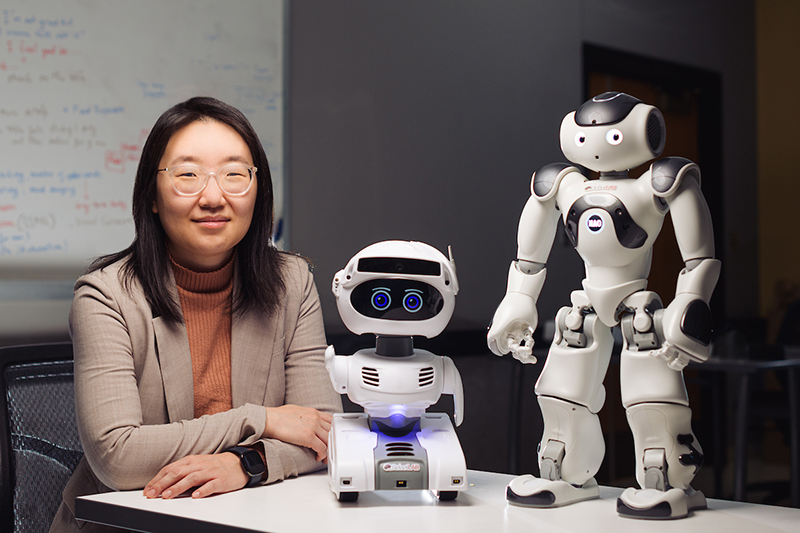July 31, 2024
Latest in AI research: Improving life and wellness through innovation

Robot expert Sooyeon Jeong and her lab work to make robots a force for good in human life and society. (Purdue University photo/Rebecca Robiños)
WEST LAFAYETTE, Ind. — To face the world’s most pressing challenges, Purdue University has committed its signature strengths in science and technology to creating a leading research and education program in physical AI — the application of artificial intelligence to our physical world.
Here’s just a sample of the work coming out of the many hubs across campus.
AI is a foundational component of the Institute for Physical Artificial Intelligence, a Purdue Computes initiative.
Research bests
First law of robotics: I, for one, welcome our new robot ... health care providers
Sooyeon Jeong, assistant professor of computer science, works in artificial intelligence to ensure that robots are more friendly helpers to humans and less inscrutable interlopers, more R2-D2 than HAL, more Baymax than Terminator.
From designing robots that socialize with hospitalized children to virtual agents helping Latinas with breast cancer in the Greater Lafayette and Chicago areas, Jeong’s projects all seek to ensure robots are doing the most good possible.
“As robots become more available in people’s daily lives, we need to make sure they’re helping in real ways, long term, in the real world,” Jeong said.
Related: When AI’s jokes fall flat
Watch (2:45): The complexities of humor make it difficult to teach conversational AI to be as humanlike as possible, says Julia Rayz, associate head of the Department of Computer and Information Technology at Purdue Polytechnic Institute.
Green energy: AI algorithm for improving nuclear reactor performance
With a new machine learning algorithm, Purdue engineers have made progress in figuring out how AI could improve monitoring and control systems overseeing small modular reactors (SMRs). The algorithm can rapidly learn about the physics behind a measurement of how steadily a reactor is producing power and predict changes in this indicator over time with 99% accuracy.
The discovery points to ways that AI might help cut the costs of operation and maintenance for SMRs so they can be more economically viable.
(Fun fact: The study was conducted using a “digital twin” of the PUR-1 reactor at Purdue. This is the first and only reactor in the U.S. licensed with a fully digital instrumentation and control system.)
Seeing the pattern: Machine learning + wearable sensors reliably track tremors in older adults
Scientists in biomedical engineering have developed machine learning techniques to closely analyze a person’s wrist tremors, determining if patterns are the result of normal aging or a diagnosable disorder.
Why?
Reliably distinguishing normal age-related hand and wrist tremors from those caused by disorders would improve diagnosis, treatment and quality of care in older adults. And because a person’s shakiness can be affected by medications, blood sugar or sleep, being able to reliably assess natural versus disordered patterns of movement with the human eye proves tricky.
Institute for Physical Artificial Intelligence
Dimensions of Discovery: IPAI Special Edition
A special edition of the Office of Research’s monthly newsletter highlights the breadth of artificial intelligence research taking place across IPAI at Purdue, including discussions of governance and responsible AI, the use of AI in accelerating drug discovery, and an autonomous space station maintenance bot.
 A robot that can grasp different kinds of items is essential for setting up future space habitats. Juncheng Li (left) and David Cappelleri are working to make grasping robots more autonomous, versatile and resilient. (Purdue University photo/Jared Pike)
Download image
A robot that can grasp different kinds of items is essential for setting up future space habitats. Juncheng Li (left) and David Cappelleri are working to make grasping robots more autonomous, versatile and resilient. (Purdue University photo/Jared Pike)
Download image
Collaborative research spotlight — #NSFfunded
Mobile video game submerges users into ocean depths
This National Science Foundation feature highlights a video game that could improve our understanding of and ability to monitor the health of the deep sea and its ecosystems.
In FathomVerse, players interact with Monterey Bay Aquarium Research Institute’s archive of deep-sea footage as the start of a process used to train AI in performing identification and tagging on its own.
FathomVerse is just one outcome of the larger Ocean Vision AI program, seeking to make artificial intelligence and ocean research more accessible and impactful, with support from the NSF, the David and Lucile Packard Foundation, National Geographic Society, and the National Oceanic and Atmospheric Administration.
Something fun
AI and theme parks
Watch (3:41): Chris Rogers, a Purdue associate professor and director of the Computer Graphics Technology program in Indianapolis, explains new attractions announced by major theme parks. He also shares how AI technology and devices are already being used to customize the visitor experience, and ways parks are harnessing artificial intelligence to look toward the future.
That’s all for now from the university boasting the first computer science department in the country. Purdue University is building a world-leading program in artificial intelligence.
Leveraging Purdue’s signature strengths in materials science, engineering, microelectronics, computer science, agriculture and life sciences, the Institute for Physical AI is committed to solving the world’s toughest challenges.
About Purdue University
Purdue University is a public research institution demonstrating excellence at scale. Ranked among top 10 public universities and with two colleges in the top four in the United States, Purdue discovers and disseminates knowledge with a quality and at a scale second to none. More than 105,000 students study at Purdue across modalities and locations, including nearly 50,000 in person on the West Lafayette campus. Committed to affordability and accessibility, Purdue’s main campus has frozen tuition 13 years in a row. See how Purdue never stops in the persistent pursuit of the next giant leap — including its first comprehensive urban campus in Indianapolis, the Mitchell E. Daniels, Jr. School of Business, Purdue Computes and the One Health initiative — at https://www.purdue.edu/president/strategic-initiatives.
Writer/Media contact: Christy McCarter, mccarter@purdue.edu

